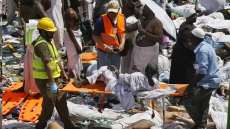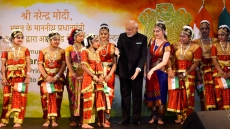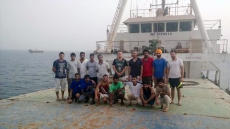Nearly two years after his arrest in Egypt on widely denounced terrorism charges, Canadian journalist Mohamed Fahmy walked out of prison a free man Wednesday following a presidential pardon.
Fahmy and his colleague and co-accused Baher Mohamed were among 100 people — including dozens of prominent human rights activists — pardoned by President Abdel-Fattah el-Sissi.
"I am free! This time for real! Cops dropped me at CAC my old high school in my prison garb. Party Time! #FreeAJStaff" Fahmy tweeted moments after his release.
His wife, Marwa Omara, said she was visiting Fahmy in prison when she learned the news of his pardon from a TV set that was on.
"I was scared for his health from too much joy," she said, adding that the first thing they plan to do is have a large wedding party to celebrate their recent marriage.
Fahmy's lawyer confirmed the release, saying she was delighted that Fahmy and Mohamed were finally free.
"It has been a long ordeal, and we are grateful to President Sissi for exercising his power to pardon the two journalists," Amal Clooney said in a statement.
"This is a historic day in Egypt where the government has finally corrected a long-standing injustice, and set two innocent men free".
An emailed statement from the Egyptian president's office said the pardons were given to people "who have received final prison verdicts in cases related to breaking a protest law or infringing on the police forces' actions, in addition to a number of health-related and humanitarian cases."
The pardon also came a day before el-Sissi is to travel to New York to attend the United Nations General Assembly.
Fahmy was given a three-year sentence last month after his second trial — an outcome that shocked international observers.
The 41-year-old's troubles began in December 2013 when he was working as the Cairo bureau chief for Qatar-based satellite news broadcaster Al Jazeera English.
He and two colleagues were abruptly arrested and charged with a slew of offences, including supporting a banned organization and with fabricating footage to undermine the country's national security.
The trio maintained their innocence throughout, saying they were just doing their jobs, but after a trial that was internationally decried as a sham, they were found guilty and sentenced to prison terms.
An appeal of their convictions resulted in a second trial, although one of them, Australian Peter Greste, was abruptly deported under a law which allows for the deportation of foreign nationals convicted of crimes.
Fahmy gave up his Egyptian citizenship while behind bars in the hopes that he could follow the same path, but that didn't happen.
He and his other colleague, Egyptian Baher Mohamed, were, however, granted bail during their retrial, which culminated in last month's surprising verdict.
Following the verdict, Ottawa had formally asked Egypt's president to pardon Fahmy or allow his deportation to Canada.
The federal government said it welcomed Wednesday's developments.

"Canada is pleased that Egyptian President el-Sisi has granted Mr. Fahmy a pardon," said a spokeswoman with the department of foreign affairs. "We look forward to Mr. Fahmy reuniting with his family and loved ones, and his return to Canada."
The court that convicted Fahmy said he and his colleagues were, by default, members of the banned Muslim Brotherhood group — considered a terrorist organization by Egypt — because their employer, Al Jazeera, "dedicated its broadcasting to the service and support of the Muslim Brotherhood faction.''
Al Jazeera is owned by Qatar, which has had a tense relationship with Egypt ever since the Egyptian military ousted the country's former president Mohamed Morsi amid massive protests. Qatar is a strong backer of Morsi's Muslim Brotherhood.
Al-Jazeera did not immediately respond to a request for comment Wednesday, but the network said in a report on its English-language website that it "continues to demand all charges and sentences against its journalists are dropped" despite plans to release the two journalists.
The Committee to Protect Journalists welcomed the journalist's pardons.
"But this is just a first step," the CPJ statement said. "Egypt can begin tackling its shameful record of press freedom by releasing all journalists imprisoned for their work in the country."
Fahmy moved to Canada with his family in 1991, living in Montreal and Vancouver for years before eventually moving abroad for work, which included covering stories for the New York Times and CNN.
Once he leaves Egypt, Fahmy has said he plans to take up a position as an adjunct professor at the University of British Columbia's school of journalism in Vancouver. He is also writing a book about his experiences.
Fahmy's journey from journalist to 'terrorist' to freedom of the press crusader
Mohamed Fahmy has been celebrated as a journalist, denounced as a terrorist and described as a bargaining chip in a notoriously complex power struggle among Middle Eastern countries.
Yet whether he was accepting international awards for his investigative reporting or shedding light on a political maelstrom by voicing his more personal struggles, the 41-year-old has remained staunchly committed to what he views as the bedrock of his chosen field.
"I try in my journey as a journalist not to obsessively take on the role of an agent of democratic change usually embraced by many members of our prestigious fourth estate. But, I still live to challenge governments in their shortcomings through my craft," Fahmy wrote in a message delivered to the advocacy group Canadian Journalists for Free Expression. "It's a cause not worth dying for, but in time it becomes a way of life, even behind bars."
Fahmy's tenacity has played out on a global stage over nearly two years ever since he and two of his Al Jazeera English colleagues — Australian correspondent Peter Greste and Egyptian producer Baher Mohamed — were arrested in Cairo in December 2013.
The trio were accused of supporting the Islamist Muslim Brotherhood, a banned organization affiliated with ousted Egyptian president Mohammed Morsi, and fabricating footage to undermine Egypt's national security.
Fahmy himself said the three imprisoned journalists were innocent victims of the "cold war" between Egypt and Qatar, which funds Al Jazeera and had been a strong Morsi backer.
The journalists and their supporters insisted they were simply doing their jobs during a time of violent upheaval.
Fahmy was initially convicted and sentenced to jail time in 2014 after a judge ruled he and his colleagues had been "brought together by the devil" to destabilize the country that Fahmy once called home. A second trial ordered after Fahmy appealed the conviction returned the same verdict and destined him to three more years behind bars before he was granted a presidential pardon on Wednesday.
Among the outpouring of international criticism declaring the trials a sham and calling for the journalist's release, few voices were as prominent or consistent as Fahmy's.
He routinely shouted from the prisoner's box during court proceedings, wrote open letters decrying the case against him and his colleagues, and spoke out against a regime that hampered the pursuit of journalism within its borders.
He voiced his opposition despite holding what loved ones described as a deep affection for his native country.
His wife Marwa Omara previously told the Canadian Press that Fahmy hailed from a family of serviceman and considered himself a "proud Egyptian."

But Fahmy has also put down roots in Canada, the country he moved to in 1991 and plans to return to upon his release.
Fahmy first moved to Montreal where he became an ardent fan of the Canadiens. He also lived for a time in Vancouver before moving abroad to pursue what became an acclaimed journalism career.
His reporting took him to conflict zones in Libya and Lebanon and prompted him to write a book about the U.S. invasion of Iraq.
His work was featured in international outlets including the New York Times and NPR, and a documentary he helped prepare for CNN ultimately garnered international praise. He and his team won the 2011 Tom Renner Investigative Journalism award, a global honour handed out by International Reporters and Editors.
Judges cited the courage and resourcefulness of Fahmy and his teammates as they pursued a difficult story.
"CNN's team faced great personal risk in crossing the dangerous badlands of Egypt's Sinai Peninsula to expose a network of human trafficking and organ sales," they wrote in the award citation.
Fahmy was working as Al Jazeera's Cairo bureau chief when he was arrested, an assignment he told CJFE he accepted as a "personal challenge."
More challenges await Fahmy when he is released from prison, an event only made possible after he reluctantly opted to renounce his Egyptian citizenship. Not the least of those challenges will be dealing with infuriated family members who feel betrayed by his decision, according to Fahmy's brother.
But the journalist has set other tasks for himself too. He told CJFE he intends to "start a debate" on how the Canadian government, which has lobbied for his release, handles similar situations in the future.
Most of all, he said he intends to remain committed to the cause that brought about his ordeal in the first place.
"I have been intrigued lately by a motto I spotted that reads: "Information is Ammunition," Fahmy wrote. "We must unite before more of us become just another statistic languishing behind bars."
Key dates in the case of Mohamed Fahmy, Canadian journalist who faced terror charges in Egypt
Egypt's president has pardoned Canadian journalist Mohamed Fahmy, who was imprisoned in Cairo on widely-denounced terror charges.
Here are some key dates in Fahmy's story:
— 1991: Fahmy and his family move to Canada. They spend years living in Montreal and Vancouver. Fahmy obtains his Canadian citizenship before leaving the country to pursue a career in journalism, which sees him cover stories for major media outlets such as CNN and the New York Times.
— September 2013: Fahmy takes over as acting bureau chief of Al Jazeera English in Cairo. Within days of taking the reins, Fahmy raised concerns about the security status of the network's journalists working in Egypt.
— Dec. 29, 2013: Egyptian authorities arrest Fahmy and two of his Al Jazeera colleagues, Australian correspondent Peter Greste and Egyptian producer Baher Mohamed. The trio are accused of supporting the Islamist Muslim Brotherhood, a banned organization affiliated with ousted Egyptian president Mohammed Morsi. They are also charged with fabricating footage to undermine Egypt's national security.
— Jan. 13, 2014: More than 50 news organizations around the world call on Egyptian authorities to release the detained journalists.

— Feb. 20, 2014: The trial for Fahmy, Greste and Mohamed gets underway in Cairo. The three journalists plead not guilty and shout from the dock that their prison conditions are "psychologically unbearable.''
— June 23, 2014: The court convicts the three journalists, sentencing Greste and Fahmy to seven years in prison and Mohammed to 10 years. The verdict brings a wave of international condemnation and calls for newly elected President Abdel Fattah el-Sissi to intervene.
— June 24, 2014: After critics voice concerns that the Canada's federal government hasn't reacted forcefully enough to the verdict against Fahmy, Foreign Affairs Minister John Baird says his department is working to secure the journalist's release. He cautions, however, that "bullhorn diplomacy'' will do more harm than good.
— June 25, 2014: Prime Minister Stephen Harper speaks out against the verdict, saying Canada is "deeply concerned'' by the court decision and sentence handed down against Fahmy and his colleagues.
— July 6, 2014: El-Sissi acknowledges for the first time, in comments to editors of Egyptian media outlets, that the heavy sentences had a "very negative'' impact on his country's reputation, saying he wished the three were never put on trial.
— July 23, 2014: The judge releases his reasoning for his sentence, saying the journalists were brought together "by the devil'' to destabilize the country.
— Nov. 12, 2014: El-Sissi issues a new decree granting him the power to deport foreigners convicted or accused of crimes, a move that could allow him to free the imprisoned journalists. Fahmy's case remains something of a grey area, however, since he holds dual Canadian and Egyptian citizenship.
— Nov. 20, 2014: El-Sissi says in an interview with a French TV channel that a presidential pardon is "being examined'' for the three journalists.
— December 2014: Fahmy's lawyers write a letter to Prime Minister Stephen Harper and Foreign Affairs Minister John Baird urging them to fight for the journalist's release.
— Jan. 1, 2015: Egypt's equivalent of a Court of Appeal orders a retrial in the case after a hearing that lasts only minutes. The three journalists are not granted bail.
— Jan. 6, 2015: Fahmy's family says deportation papers are being prepared for the journalist, adding they hope a pending visit from Foreign Affairs Minister John Baird will help speed up Fahmy's release and departure from Egypt.
— Jan. 15, 2015: Baird travels to Cairo to meet with Egyptian Foreign Minister Sameh Shoukry, the latest in a series of meetings held with his Egyptian counterpart over the past few months.
— Feb. 1, 2015: After spending more than a year behind bars, Australian Peter Greste is freed from prison and deported following a presidential "approval."
— Feb. 2, 2015: Fahmy's family announces he has relinquished his Egyptian citizenship, saying authorities made it a condition for his freedom.
— Feb. 8, 2015: Egyptian authorities announce that Fahmy and Mohamed are to be re-tried on Feb. 12. Fahmy's family calls the development their "worst nightmare."
— Feb. 12, 2015: Fahmy and Mohamed ordered released on bail pending the restart of their retrial scheduled for Feb. 23.
— Feb. 13, 2015: Fahmy left a Cairo prison where he had been held for more than 400 days. Lawyers said he would have to report to a police station daily pending his retrial.
— March 2015: Fahmy launches the Fahmy Foundation for Free Press, an organization which will advocate for imprisoned members of the media.
— April 22, 2015: Fahmy receives a temporary Canadian passport. His original passport was never recovered after being seized during his arrest, leaving him without official documentation.
— May 11, 2015: Fahmy announces he is suing his employer, Al Jazeera Media Network, alleging the broadcaster's actions significantly contributed to his legal woes. He seeks $100 million in damages.
— June 29, 2015: The Cairo court holding Fahmy's retrial announces that a verdict will be delivered on July 30.
— July 30: A Cairo court postpones a verdict for Fahmy to Aug. 2.
— Aug. 2: A Cairo court announces the verdict in Fahmy's trial will be delivered Aug. 29.

— Aug. 29: A Cairo court sentences Fahmy and two other Al-Jazeera English journalists to three years in prison.
—Sept. 23: Egyptian President Abdel-Fattah el-Sissi pardons Fahmy along with prominent human rights activists.



